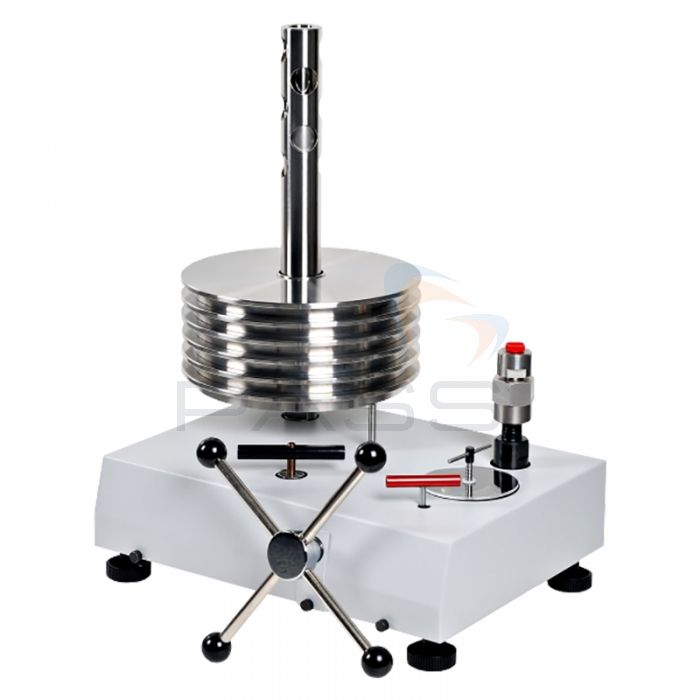Fluke P3860 High-Pressure Oil Hydraulic Deadweight Tester

- Optimised for accuracy, reliability, simplicity and efficiency
- Available in three models
- Calibrate high-pressure sensing instruments and other pressure calibrators
The Fluke P3860 High-Pressure Oil Hydraulic Deadweight Tester is able to calibrate high-pressure sensing instruments via the creation of hydraulic pressure and the addition of accurately calibrated weight masses. It is particularly well suited to calibrating transducers, transmitters, gauges, pressure switches and other pressure calibrators.
This instrument is available in three models with varying pressure ranges and measurement units. Please see the table below for details regarding the differences between these models.
| Product Code | Product Name | Pressure Range |
| P3840-BAR | Fluke P3840-BAR High-Pressure Oil Hydraulic Deadweight Tester - 4000 bar | 40 to 4000 bar |
| P3840-PSI | Fluke P3840-PSI High-Pressure Oil Hydraulic Deadweight Tester - 60k PSI | 500 to 60 000 psi |
| P3840-MPA | Fluke P3840-MPA High-Pressure Oil Hydraulic Deadweight Tester - 400 MPa | 4 to 400 MPa |
Each of these models can be purchased with EITHER a 0.02% accuracy OR 0.015% accuracy. As standard they are calibrated to standard gravity (980.665cm/s²); however, it is possible to both calibrate the deadweight tester and trim the supplied weight masses in accordance with the user’s local gravity. These changes account for the localised gravitational pull on the weight masses, thereby improving the accuracy of the instrument and calibration method. PLEASE NOTE that unless specified the deadweight tester and weight masses will be calibrated/ trimmed with regard to standard gravity, as indicated above.
The weight masses supplied with the Fluke P3860 High-Pressure Oil Hydraulic Deadweight Tester are marked with the instrument’s serial number and the nominal pressure values relative to the high-pressure piston. Moreover, they are constructed from series 3, non-magnetic stainless steel, ensuring that they are not affected by the earth’s magnetic field, again working to ensure the precision of this method.
Weight masses are added to the piston and cylinder assembly in order to balance the upward force created by the generation of hydraulic pressure. Dicotyl Sebacate (DOS) is the medium with which hydraulic pressure is created. When calibrating instruments with large volumes, the oil reservoir can be re-filled in order to generate the required pressures. A high-quality integrated hand-pump is connected to a seven-to-one intensifier, which facilitates the quick creation of hydraulic pressure in the system.
To determine the final pressure value, when the piston is at the ‘mid-floatation’ position, as indicated by the floatation indicator, the nominal values on the weight masses (added to the piston) are combined with the weight of the piston and cylinder assembly.
The piston and cylinder assembly is constructed from tungsten carbide. The assembly, like the weight masses, adds to the precision of this instrument and method; it provides longevity, stability and durability, as well as low coefficients for temperature and pressure. Further to this, the Fluke P3860 High-Pressure Oil Hydraulic Deadweight Tester is supplied with an ISO/ IEC 17025 accredited calibration certificate.
As well as being accurate and simple-to-use, the Fluke P3860 High-Pressure Oil Hydraulic Deadweight Tester is also easy to assemble. Its test-station design allows instruments-under-investigation to be connected quickly, whilst its adjustable feet and level vial ensures that it be set up accurately in a variety of worksites.
The Fluke P3860 High-Pressure Oil Hydraulic Deadweight Tester is a versatile high-pressure calibrator optimised for reliability, accuracy, longevity and efficiency.
Fluke P3860 High-Pressure Oil Hydraulic Deadweight Tester Key Features
- Calibrate high-pressure sensing instruments via the creation of hydraulic pressure and addition of accurately calibrated weight masses
- Ideal for calibrating transducers, transmitters, gauges, pressure switches and other pressure calibrators
- Available in three variations with differing pressure ranges and measurement units
- Available with EITHER a 0.02% OR 0.015% accuracy
- Calibrated to standard gravity (980.665cm/s²) as STANDARD
- OPTION to calibrate the tester to the user’s local gravity
- OPTION to trim the weight masses to account for the user’s local gravity
- Weight masses are marked with the instrument’s serial number and nominal pressure values relative to high-pressure pistons
- Weight masses are constructed from series 3, non-magnetic stainless steel
- Weight masses are added to the piston to balance the upward force created by the hydraulic pressure
- Dicotyl Sebacate (DOS) is the medium with which hydraulic pressure is created
- Oil reservoir can be re-filled during hydraulic pressure creation
- The integrated high-quality hand-pump is connected to a 7-to-1 intensifier which facilitates the quick creation of hydraulic pressure
- When the piston is at the mid-floatation point, as indicated by the floatation indicator, the final pressure value can be determined
- The final pressure value is determined by adding the nominal values marked on the weight masses (added to the piston) to the weight of the piston and cylinder assembly
- The piston and cylinder assembly is constructed from tungsten carbide
- The assembly provides longevity, durability, stability and low coefficients for temperature and pressure
- Supplied with an ISO/ IEC 17025 accredited calibration certificate
- Test-station design
- Adjustable feet
- Level vial
- Versatile high-pressure calibrator optimised for reliability, accuracy, longevity and efficiency
What’s Included?
- Your Choice of Fluke P3860 High-Pressure Hydraulic Deadweight Tester
- Weight Masses
- ISO/ IEC 17025 Accredited Calibration Certificate
- Operating Fluid
- High-Pressure Adapters
Call 01642 931 329 or complete the form:
Offers
 Spend £150+ (Ex VAT) on any qualified Fluke or Beha-Amprobe product(s) and claim a free tool of your choice from the list at Fluke Promotion. Valid February 17 2025 - July 31 2025.
Spend £150+ (Ex VAT) on any qualified Fluke or Beha-Amprobe product(s) and claim a free tool of your choice from the list at Fluke Promotion. Valid February 17 2025 - July 31 2025.
Claims are made direct to Fluke. Terms and conditions apply.
Fluke P3860 High-Pressure Oil Hydraulic Deadweight Tester Technical Specifications
| Pressure Ranges | 500 to 60,000 psi or 40 to 4,000 bar or 4 to 400 MPa or 40 to 4000 kgf/cm2 |
| Accuracy* | Standard accuracy is 0.02% of Reading*. Optional accuracy of 0.015% of Reading is available. ISO/IEC 17025 accredited calibration is provided with each instrument. *Accuracy is based on % of Reading from 10% to 100% of the piston range when used in accordance with the corrections found on the calibration certificate. Below 10%, ± (accuracy class) x 10% of the piston range. See the “Guide for the Uncertainty Analysis in Pressure when Using P3000 Series Deadweight Testers” technical note for more information. |
| Materials of Construction | |
| Standard weight material | Series 3 non-magnetic, austenitic, stainless steel |
| Weight density | 7.8 g/cm3 |
| Piston Material | Tungsten carbide with nickel binder |
| Cylinder Material | Tungsten Carbide with cobalt binder |
| Thermal Coefficient of Expansion | 11 ppm/°C |
| General Specifications | |
| Test port adapters | 9/16 – 18 UNF (Autoclave); 3/8 BSP; 1/2 BSP & 3/4 BSP |
| Instrument Weight | 66 lbs. (30 Kg) Instrument Base only |
| Instrument Size | 18 in. X 13.5 in. X 19 in. (455 X 340 X 478 mm) |
| Reservoir Volume | 235 cc (14.3 cu.in.) |
| Intensifier ratio | 7 to 1 |
| Seal Materials | Nitrile |
| Operating Fluid | Dioctyl Sebacate (DOS) |




